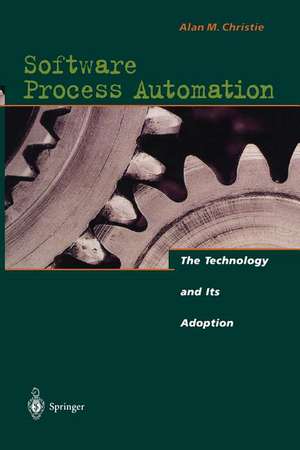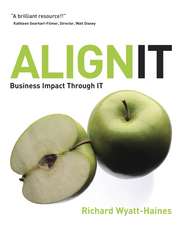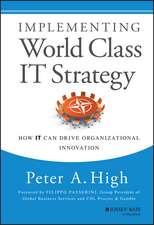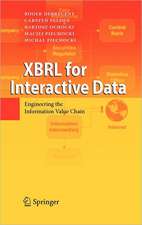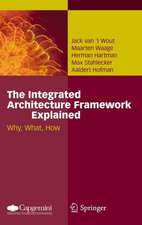Software Process Automation: The Technology and Its Adoption
Autor Alan M. Christieen Limba Engleză Paperback – 30 dec 2011
This book is for those who wish to explore the technology or are considering its adoption. The monograph discusses the underlying concepts, reviews in some detail two of the major process automation products, relates process automation to process improvement, and provides adoption guidelines. Special emphasis is on the process modeling language ProNet which is commercially available. The book is enriched by numerous examples, tables, and technical appendices.
Preț: 329.26 lei
Preț vechi: 411.57 lei
-20% Nou
Puncte Express: 494
Preț estimativ în valută:
63.01€ • 65.39$ • 52.67£
63.01€ • 65.39$ • 52.67£
Carte tipărită la comandă
Livrare economică 15-29 martie
Preluare comenzi: 021 569.72.76
Specificații
ISBN-13: 9783642792540
ISBN-10: 3642792545
Pagini: 232
Ilustrații: XII, 217 p.
Dimensiuni: 155 x 235 x 12 mm
Greutate: 0.33 kg
Ediția:Softcover reprint of the original 1st ed. 1995
Editura: Springer Berlin, Heidelberg
Colecția Springer
Locul publicării:Berlin, Heidelberg, Germany
ISBN-10: 3642792545
Pagini: 232
Ilustrații: XII, 217 p.
Dimensiuni: 155 x 235 x 12 mm
Greutate: 0.33 kg
Ediția:Softcover reprint of the original 1st ed. 1995
Editura: Springer Berlin, Heidelberg
Colecția Springer
Locul publicării:Berlin, Heidelberg, Germany
Public țintă
Professional/practitionerCuprins
1 Software Process Automation in Perspective.- 1.1 The Origins of Software Process Automation.- 1.2 Automation in a Process Improvement Context.- 1.3 A Process Development and Usage Scenario.- 2 Process Definition, Execution and Verification.- 2.1 Underlying Concepts.- 2.2 Process Definition and Executable Specification.- 2.3 The ProNet Graphical Modeling Language.- 2.4 Developing an Approach to Process Execution.- 2.5 Two Examples of Process Execution.- 2.6 Software Process Verification.- 2.7 Miscellaneous Issues.- 2.8 Summary.- 3 An Investigation into Process-Centered Environments.- 3.1 Setting a Context for PCEs.- 3.2 The Experimental Approach.- 3.3 The ProcessWeaver Experiment.- 3.4 The Synervision Experiment.- 3.5 End-User Role Plays.- 3.6 A Comparison of ProcessWeaver and Synervision.- 4 The Application of Process-Centered Environments.- 4.1 Why Use a Process-Centered Environment?.- 4.2 Issues Related to CASE and Process Improvement.- 4.3 Responses to Adopting New Technology.- 4.4 User-Oriented Issues with PCEs.- 4.5 A Transitioning Strategy.- 5 The Past, Present, and Future of Process Automation.- Appendix A The Process Enactment Program, ProSim.- A.1 The Process Controller Listing.- A.2 The codeDevel Process.- A3 The docUpdate Process.- Appendix B The Process Verification Program.- Appendix C Vendor Information on PCEs.- Appendix D Listing of SynerVision Experiment Script.- Appendix E Terminology and Concepts.- E.1 Basic Terminology.- E.2 Process-Related Concepts.- E.3 Relationship to the NIST/ECMA Reference Model.- Appendix F End-User Evaluation Materials.- References.
